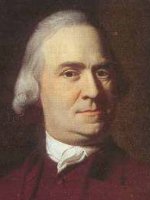“She entertaind me with a very fine Dish of Green Tea”
On 1 August, Abigail wrote back to her husband from Boston (where she had taken the whole family, plus servants and relatives) to be inoculated against the smallpox:
I Received a wedensday by Mr. Gerry your Letter of july 15. I have not yet seen him to speak to him. I knew him at meeting yesterday some how instinctively; tho I never saw him before. He has not call’d upon me yet. I hope he will, or I shall take it very hard, shall hardly be able to allow him all the merrit you say he possesses. It will be no small pleasure to me to see a person who has so lately seen my best Friend. I could find it in my Heart to envy him.By 3 August, Gerry had called on Abigail Adams, he reported to both John and his cousin Samuel:
I have had the pleasure of seeing both Mrs. Adams and find them and Families in fine Health and Spirits. Mrs. Samuel Adams is removed from her own Habitation to a House near Liberty Tree, and with the greatest pleasure speaks of the Inconveniences she has suffered as trifling and such as must always be expected at the forming a mighty Empire. Mrs. John Adams with two of her little Heroes by her Side is perfectly recovered of the small pox; the others are in a fair Way.But as for that pound of green tea? On 7 September Abigail wrote about visiting Elizabeth Adams:
I was upon a visit to Mrs. S. Adams about a week after Mr. Gerry returnd, when She entertaind me with a very fine Dish of Green Tea. The Scarcity of the article made me ask her Where she got it. She replied her Sweet Heart sent it to her by Mr. Gerry.Unfortunately, the Samuel Adams Papers at the New York Public Library don’t contain any letters from Elizabeth during this summer. She probably sent some to Samuel (though not as many as Abigail sent John), but this family wasn’t as careful about saving documents. Indeed, John wrote about seeing his cousin burning sensitive papers before one of the Congress’s evacuations from Philadelphia. Therefore, we have no note from Elizabeth thanking “her Sweet Heart” for the tea, or from Samuel wondering what that was all about.
Meanwhile, Abigail’s letter to John continued:
I said nothing, but thought my Sweet Heart might have been eaquelly kind considering the disease I was visited with, and that [tea] was recommended as a Bracer. A Little after you mention’d a couple of Bundles sent. I supposed one of them might contain the article but found they were Letters.John had indeed not mentioned the tea in the letter he gave to Gerry to deliver, or in any other letter for two more weeks. So Gerry had left Boston by the time Abigail could ask.
How Mr. Gerry should make such a mistake I know not. I shall take the Liberty of sending for what is left of it tho I suppose it is half gone as it was very freely used. If you had mentiond a single Word of it in your Letter I should have immediately found out the mistake.
While Abigail’s letter was en route to Philadelphia, one from John dated 5 September was heading north, showing how he’d figured out the same mystery:
I never conceived a single doubt, that you had received it untill Mr. Gerrys Return. I asked him, accidentally, whether he delivered it, and he said Yes to Mr. S.A.’s Lady.—I was astonished. He misunderstood Mrs. Y[ard]. intirely, for upon Inquiry she affirms she told him, it was for Mrs. J.A.Perhaps Sarah Yard, landlady of the Massachusetts delegates’ boardinghouse in Philadelphia, had asked Gerry to deliver the tea to ‘Mrs. Adams in Boston.’ He hadn’t met Abigail before. He may not have known she was in Boston that summer. So Gerry assumed the tea was for the wife of his colleague Adams from Boston.
I was so vexed at this, that I have ordered another Cannister, and Mr. Hare has been kind enough to undertake to deliver it. How the Dispute will be settled I dont know. You must send a Card to Mrs. S.A., and let her know that the Cannister was intended for You, and she may send it you if she chooses, as it was charged to me. It is amazingly dear, nothing less than 40s. lawfull Money, a Pound.
We don’t have any letters between Elizabeth and Abigail Adams, unfortunately. But on 20 September Abigail wrote to John:
Yours of Sepbr. 5 came to Night to B[raintre]e and was left as directed with the Cannister. Am sorry you gave yourself so much trouble about them. I got about half you sent me by Mr. Gerry. Am much obliged to you, and hope to have the pleasure of making the greater part of it for you.Back in 1773, about 22% of the tea destroyed in the Boston Tea Party was green tea, but that accounted for 30% of the value. Green tea was thus a bit of a luxury even before wartime.
TOMORROW: What was on Elbridge Gerry’s mind.





